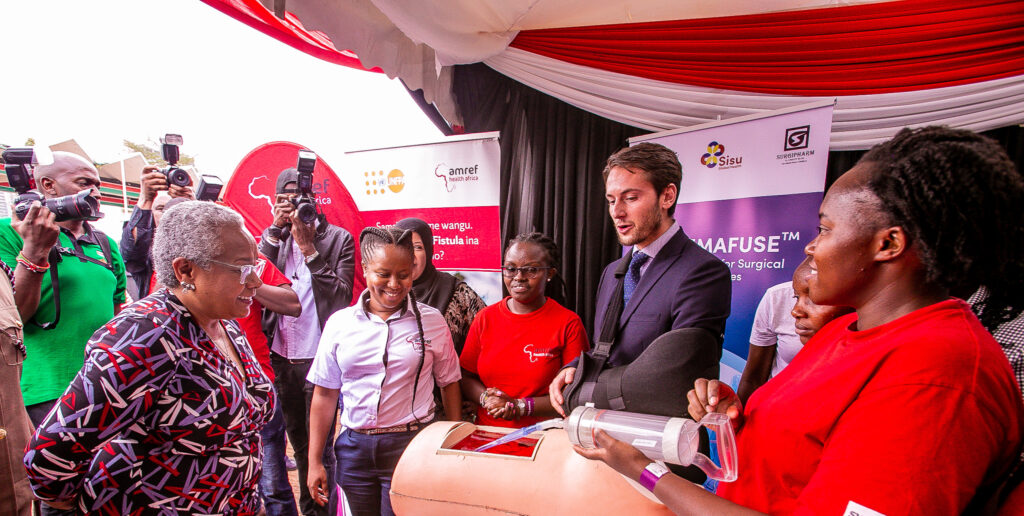The First Lady’s Beyond Zero Kenya initiative has donated an autotransfusion surgical device – HEMAFUSE – to Mama Lucy Kibaki Hospital to help reduce maternal deaths.
The device was handed over to Dr Musa Mohamed, Medical Superintendent at Mama Lucy Hospital by the First Lady H.E Margaret Kenyatta during the launch of the Nairobi Beyond Zero Medical Safari held at Uhuru Park Nairobi on 25 January 2020.
The HEMAFUSE system, the first of its kind in Kenya, is designed to salvage and recycle whole blood from cases of internal bleeding. The device can be used in emergencies and scheduled procedures to transfer blood from where it is pooled internally to a blood a bag, where it is immediately re-transfused.

It is used to save the lives of patients especially women with ruptured ectopic pregnancies, postpartum haemorrhage (excessive bleeding after childbirth) and other cases where blood can be salvaged and re-transfused. Postpartum haemorrhage is the leading cause of maternal mortality worldwide. In 2016, it was reported that 9,854 mothers died due to PPH in Kenya (Ministry of Health, Kenya; Health Information).
The medical safaris are at the core of the First Lady’s Second Beyond Zero Strategic Framework, which runs from 2018-2022, with a special emphasis on reducing maternal and child deaths and preventing new HIV infections. Nairobi County residents will receive free medical services such as fistula repair, cancer screening, routine medical screening, counselling and testing services.
Speaking during the event, the First Lady commended the concerted efforts by partners involved in the Fistula repair camp working tirelessly to give women new hope to live a stigma-free life. She restated her commitment to continuing advocating for initiatives aimed at improving the provision of quality health care for women and children.
“My commitment to contribute towards Universal Health Coverage (UHC) remains a priority. We will address the growing pressure for people-centred quality care by providing easy access to quality services,” she said.
Across Sub-Saharan Africa, maternal hospital cases utilise a majority of blood products. With a severe shortage of donor blood or in instances where an appropriate medical device is not available to facilitate life-saving surgery, a mother’s life remains in danger.
“Autotransfusion is not a new method. Surgeons have been using it for a while through improvisation. In some facilities, some surgeons will use sterile clothes to sieve blood into a urine pack, which is not recommended as it does not have the proper ingredient to make the blood suitable for transmission, but because it is a matter of life and death, they opt to improvise,” said Dr Elizabeth Wala, Programme Director for Health Systems Strengthening at Amref Health Africa in Kenya.
Dr Wala reiterated the importance of using a high-quality device to save lives stating that the Kenya Pharmacy and poison board, as well as ISO-13585, had approved the surgical device.
“Blood is a matter of life and death, the impact of this device is saving lives that could have been lost due to lack of blood. Achieving UHC requires innovations for essential medicines and health technologies that save lives. HEMAFUSE should be part of the essential medical devices in each hospital,” she added.
Amref Health Africa in Kenya has partnered with Sisu Global Health, manufacturers of the HEMAFUSE system to help increase the availability of blood in the country. Using the System makes blood available in time-critical situations where delayed supply can result in negative outcomes, improves the efficiency of operating theatre and physician time, and provides higher quality blood for the hospitals that use the surgical device.
Earlier, the First Lady visited Mama Lucy Kibaki Hospital where Amref’s Health System Strengthening Programme in partnership with UNFPA Kenya has been conducting free reconstructive surgeries to patients suffering from obstetric fistula
